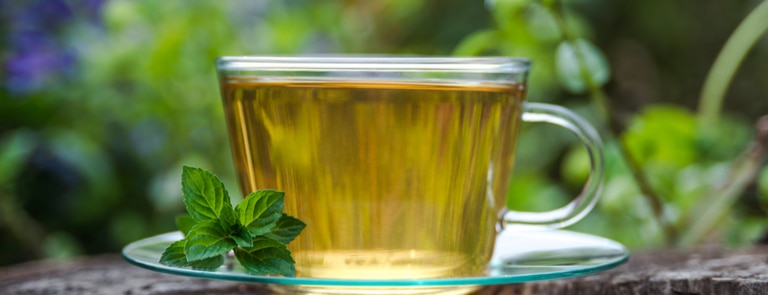15% off €30 or 20% off €40
8 benefits of drinking peppermint tea every day

It’s more than just a refreshing drink. Peppermint tea could hold some impressive health benefits which will have you reaching for the kettle.
What is peppermint tea?
Peppermint tea is a popular drink made from the leaves of the peppermint plant (Mentha x piperita) steeped in hot water.
People have been using the mint plant in food and medicine for centuries, but the peppermint plant itself isn’t actually that old. It was first cultivated in 18th century England as a hybrid of spearmint and watermint.1
Calorie and caffeine-free, peppermint tea is valued worldwide for its properties as an aperitif, digestive aid and sharp, cooling taste.
Types of peppermint tea
-
Bags
From the bargain-basement variety to the gourmet, peppermint tea bags are widely available in the UK. Tea bags are an inexpensive way to get your peppermint fix. Other varieties, such as peppermint green tea, peppermint and liquorice tea and organic peppermint tea are also available.
-
Loose leaf
Loose leaf peppermint tea feels like a daily luxury. The ritual of pouring the hot water over the dried peppermint tea leaves and leaving it to brew for 3 -5 minutes allows you a moment of pause in a hectic day. Loose leaf mint tea can also be used for iced mint tea – herbal tea infused and left to chill in the fridge.
-
DIY
The most authentic of all – DIY peppermint tea simply involves steeping fresh leaves from the peppermint plant in boiling water. You could then strain the tea into another glass and discard the leaves – or push them to the bottom with a teaspoon to make a stronger drink.
It’s a good idea to rinse fresh mint tea leaves before beginning the process to remove any soil or bacteria.
What does peppermint tea do?
Peppermint tea, as well as being a delicious, refreshing beverage, comes with certain health benefits.
-
Relief from digestive upset
Peppermint tea for stomach upsets is possibly its most well-known medicinal use.
Studies have shown that peppermint oil – which peppermint leaves contain – can help prevent spasms in the muscles which line the gut.
Studies show that herbal remedies including peppermint oil can have a significant effect on the treatment of gastric disorders.2
-
Fresher breath
Toothpaste and breath fresheners taste of mint for a reason.
Peppermint is a powerful breath-freshener – and studies have shown rinsing the mouth with peppermint is very effective at removing traces of halitosis (bad breath).3
This is because peppermint is antibacterial and kills the germs which cause bad breath.
Peppermint tea isn’t as potent as peppermint oil, but you can still enjoy the mouth-freshening effect of mint in every cup.
-
Might help you lose weight
A calorie-free, hydrating beverage, peppermint tea is always a good choice for weight loss.
But did you know that the mere scent of peppermint can temporarily stave off hunger? More than just an old wives’ tale, peppermint’s role in appetite control is confirmed by science.
A 2007 study found that by inhaling peppermint several times a day, people consumed fewer calories and reported less overall hunger.4
If you’re considering a snack before dinner, see if a large mug of peppermint tea can help tide you over instead.
-
Ward off nausea
A cup of peppermint tea may also be able to offer some relief from nausea.
One study found that the scent of peppermint helped reduce post-operative nausea in women following a C-section.5
Another study found a link between drinking water laced with drops of peppermint extract and a reduction in nausea and vomiting in patients following chemotherapy.6
-
Providing relief from colds
The active ingredient in peppermint, menthol, acts as a decongestant and helps open up your airways and loosen mucus. This can be great news if you’re experiencing sinus pain and a stuffy nose.7
Further, just sipping a warm, steamy drink when you’re all blocked up can help loosen the mucus and provide relief.
-
May help protect you from disease
Peppermint leaves contain flavenoids, vitamins and minerals which support the immune system.8
Peppermint is an antioxidant, meaning it can help rid the body of harmful free radicals which can cause inflammation, leading to various diseases.9
Most studies have been based on pure peppermint oil, but the leaves of the peppermint plant do contain the oil, so it’s worth drinking up.
-
It could help boost mental clarity
Peppermint is a fresh, energising flavour. So much so that the scent of it is thought to boost alertness and increase concentration, for example during a test.10
Inhaling the scent of peppermint has even been shown to improve memory and recall – so it might be wise to brew some peppermint tea before your next important Zoom meeting.11
-
It’s antibacterial
Peppermint tea might help rid your body of harmful bacteria and food-borne pathogens.12
More research is needed, but in one study, peppermint appeared to kill e.coli and salmonella which was growing in fruit juice.
When should I drink peppermint tea?
This is up to you. Some people choose to drink it with a meal, as it cuts through the richness of the food and could aid digestion.
It’s perfectly safe to drink before bed, too. It’s caffeine-free and could help relax you for a peaceful night.
How many cups of peppermint tea should you drink a day?
Again, the amount you can drink in a day is really up to you. There’s no real limit, although be aware there are certain side effects to consider if you consume large amounts of peppermint tea.
What is the side effect of peppermint tea?
Nutritionist Alexander Thompson says, “Peppermint tea isn’t suitable for everyone. Like all herbal products, does have specific cautions.
For example, those with acid reflux sometimes find that peppermint can worsen symptoms. It’s therefore important for anyone with any health conditions or taking any medication to check personal suitability with their doctor before drinking peppermint tea – just to be safe.”
Last updated: 14 April 2021
- https://www.gardeningknowhow.com/edible/herbs/mint/growing-peppermint-plant.htm
- https://onlinelibrary.wiley.com/doi/full/10.1046/j.1365-2036.2002.01339.x
- https://www.ncbi.nlm.nih.gov/pmc/articles/PMC3894100/
- https://www.researchgate.net/publication/247357832_Effects_of_peppermint_scent_on_appetite_control_and_caloric_intake
- https://pubmed.ncbi.nlm.nih.gov/22034523/
- https://journals.sagepub.com/doi/full/10.1177/1534735420967084
- https://www.uchealth.org/today/the-power-of-peppermint/
- https://www.ncbi.nlm.nih.gov/pmc/articles/PMC6943609/
- https://pubmed.ncbi.nlm.nih.gov/16767798/
- https://www.npr.org/templates/story/story.php?storyId=9040969&t=1607462407862
- https://pubmed.ncbi.nlm.nih.gov/18041606/
- https://www.sciencedirect.com/science/article/pii/S1878535211000232



